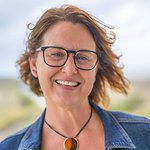
Kimberly Rogers
Affiliations Personal homepagehttps://kimberlygrogers.weebly.com
Professional homepagehttps://coastal.ecu.edu/coastalstudies/kimberly-rogers/
ORCID more infoNo associated ORCID account.
GitHub more infoNo associated GitHub account.
Dr. Kimberly G. Rogers studies the coupled human-natural processes shaping coastal environments. She obtained a B.Sc. in Geological Sciences from the University of Texas at Austin and began her graduate studies on Long Island at Stony Brook University’s School of Marine and Atmospheric Sciences. Rogers completed her Ph.D. at Vanderbilt University, where she specialized in nearshore and coastal sediment transport. She was a postdoctoral scholar and research associate at the Institute for Arctic and Alpine Research at the University of Colorado Boulder. In 2014, her foundation in the physical sciences was augmented by training in Environmental Anthropology at Indiana University Bloomington through an NSF Science, Engineering, and Education for Sustainability (SEES) Fellowship.
Research Interests
Rogers’s research is broadly interdisciplinary and examines evolving sediment dynamics at the land-sea boundary, principally within the rapidly developing river deltas of South Asia. As deltas are some of the most densely populated coastal regions on earth, she incorporates social science methods to examine how institutions — particularly those governing land use and built infrastructure — influence the flow of water and sediment in coastal areas. She integrates quantitative and qualitative approaches in her work, such as direct measurement and geochemical fingerprinting of sediment transport phenomena, agent-based modeling, institutional and geospatial analyses, and ethnographic survey techniques. Risk holder collaboration is an integral part of her research philosophy and she is committed to co-production and capacity building in her projects. Her work has gained recognition from policy influencers such as the World Bank, USAID, and the US Embassy Bangladesh and has been featured in popular media outlets such as Slate and Environmental Health Perspectives.
No submitted codebases.
Under development.